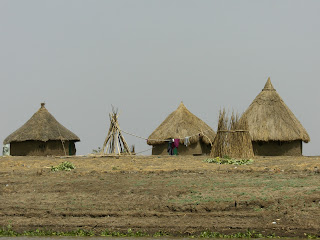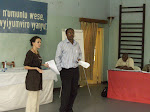 Do you know when the first Harvest Festival took place?
Do you know when the first Harvest Festival took place?We don’t know the date but it is in the Bible:
“In the course of time Cain brought some of the fruits of the soil as an offering to the LORD. But Abel brought fat portions from some of the firstborn of his flock.”
Genesis 4:3-4
From the very beginning we see people bringing to God a portion of what he had given them. After the Flood, the first thing Noah did when he and his family and all the animals touched dry land was to give back to God.
“Then Noah built an altar to the LORD and, taking some of all the clean animals and clean birds, he sacrificed burnt offerings on it.”
Genesis 8:20
And so in our harvest services there has been a traditional focus is on thanksgiving for the fruits of the earth as God's gift for all humanity and sharing these with others.
Harvest and Hunger in the Sudan
The food security situation in Southern Sudan is a reminder that so often it is man, rather than nature that is the cause of hunger.
Earlier this year, relief agencies working in South Sudan reported that food production was showing an improvement. More than two years after the end of a two-decade civil conflict, people displaced by war have been returning home. With the help of seeds and tools from aid agencies, they have begun cultivating farmlands once more. As livelihoods, transport and trade links have started to get re-established, communities have become more self-sufficient.
However, there have also been warning signs that continued localised conflict could disrupt the process, and tip the area back into widespread dependence on food aid.
Violent inter-tribal cattle raids by local tribes, who make use of the widespread available of firearms, have continued to kill and loot, the violence can often take place while people are working in the fields. This is a major barrier to Southern Sudan's return to self-sufficiency as locals become more reluctant to cultivate their crops, and some may even abandon productive land.
The Hunger Season
Southern Sudan's traditional “hunger season" is an annual cycle that runs from May to August. This happens once the fruits of the previous year's harvest are exhausted, itself the product of the years of conflict. This season has been slowly decreasing since the end of the war due to the increase in the growing of maize, sorghum and groundnuts (peanuts).
However the hunger season may be extended this year in many areas due to the destruction of crops by early flooding that started in July.
Without an ongoing peace and the assurance it brings to the locals working the land, food security in the region will remain perilous!
What the Church is doing about it?
School Feeding and School Gardens
The Episcopal Church of Sudan – Malakal Diocese
In the diocese of Malakal Bishop Hillary and his team are making sure that all their church schools receive UN World Food Programme school feeding. Due to huge food insecurity in the region, especially among children, the World Food Programme distributes food to all schools that are able to fulfil their criteria and distribute the food efficiently. All schools need a toilet, kitchen and lockable store to be eligible; some church schools still don’t have these things so the diocese is raising money to address this.
Malakal Primary School has already started preparing for a school garden by fending off a piece of land behind the school and tilling the land.Even with World Food Programme School Feeding in the church schools, the children are receiving a very limited diet which hinders growth, makes them more vulnerable to illness and affects their concentration at school.
To address this issue Bishop Hillary and the diocese have decided to start some school gardens. School gardens would not only provide supplementary food to the feeding programme and potential income generation through the sale of any excess produce but would also give an opportunity for children to learn to grow produce which would reduce their food insecurity in the future.
The Problems
However, all of the diocese church schools currently have sporadic water supplies which would make maintaining the gardens difficult and currently endanger the school feeding programmes. Lack of access to clean water in school also is also causing serious health risks for the children and teachers drinking it.
None of the schools currently have any perimeter fencing; this leaves the school vulnerable in a number of ways and in the case of school gardens is essential to cordon land off for the cultivation and to keep people and livestock from damaging the produce.
The Solutions
South Sudan has a long rainy season so the diocese would like to be able to provide guttering and water tanks to all their schools which would allow them to collect and store water which can be used for watering the gardens and for drinking and cooking. They would also like to put up perimeter fencing which would allow a plot of land to be protected for cultivation inside.

